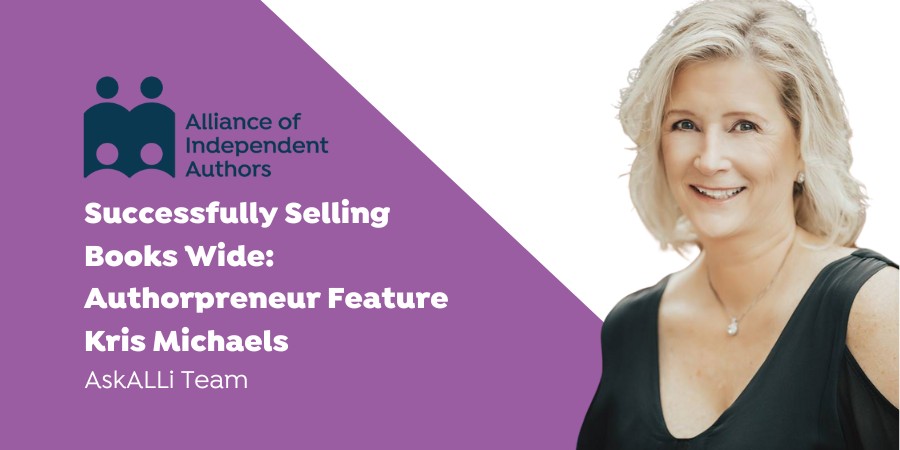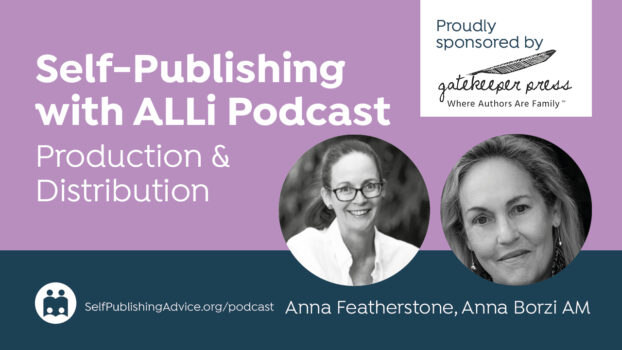Last week saw the first in a series of features we're running highlighting the successes of our authorpreneur members. Today, we're featuring another Alliance of Independent Authors authorpreneur member and the inspirational work they do. Today, it's Kris Michaels, who has found success selling books wide.

Authorpreneur Kris Michaels
Kris Michaels: Her Journey
Kris Michaels has been listed twenty times on the USA Today Bestseller List and twice on the Wall Street Journal Bestseller List. She writes romantic suspense, usually with characters from military and law enforcement backgrounds. Kris was born and raised in South Dakota. She joined the military, met her husband, and traveled the world. Today, she lives on the Gulf Coast and writes full time. Kris is an avid people watcher and dreamer. The stories she writes are crafted around the hopes and dreams of a true romantic. She believes love is essential, people are beautiful, and everyone deserves a happy ending.
Find out more about Kris on her website, Twitter and Facebook.
Q. Tell everyone a brief summary of your writing journey
I started writing full-length novels in 2012 but only for myself. I met another author on Twitter and mentioned I had written several stories. She became my first editor and introduced me to my first publisher. In 2016, after publishing six books, I had learned enough about the business that I decided to publish my stories independently. I bought back my novels from my first publisher, recovered, re-edited, bought my own ISBNs, founded my LLC, and stepped out into the world of publishing. Thankfully, I had several author friends who held my hand as I made the leap. It was the best decision I ever made. I love having complete control over my books, income, marketing, and publishing platforms.
Q. You chose book sales and specifically wide as your business model. Can you tell everyone why that was?
My first publisher did have my books established in a mix of wide and exclusive. My first indie-published book was published exclusively because I needed time to learn the other platforms. I gave myself that time by dropping that novel in the page read program. Learning all the platforms isn’t hard, but setting up accounts and figuring out how to work with each vendor is time-consuming. At least it was for me.
Moving from my first publisher meant leaving a certain level of known income, which had become my baseline. Knowing that there was no safety net if I was exclusive, should that one-platform-income stop, validated my decision to go wide.

Q. What are your main promotional and marketing methods for wide book sales?
My newsletter is my biggest asset in this department. An organically grown newsletter with a solid open and click-through rate is priceless. After that, a mixed bag of advertisements. Facebook ads, Amazon Ads, sales and promos on Kobo and Apple, and the occasional BookBub Featured Deal. I think I’ve had three BBFDs since I’ve been published.
Q. What’s the biggest lesson/s you’ve learned about being wide as an author?
Goodness, yes, I’ve made a thousand mistakes! I learned lessons the hard way. But it was through that learning process that I discovered what worked for me and my stories.
Hindsight gives excellent perspective. My biggest takeaway is that what works for other authors is not guaranteed to work for you. Your audience is not my audience, so even if you were to duplicate my publishing/promotion plan, it doesn’t always work. When marketing your books, the blend of ads/promos/newsletters/sales will be unique. Budget, time, and promotion access also play a considerable role in marketing. There is no cookie-cutter recipe for success.
Q. How have you grown your wide sales and what tips or tricks would you give to other authors wanting to do the same?
- First, look for platform-specific promotions. They work to get new eyes on your story.
- Second, work with other authors in your genre with whom you already have a relationship to promote your books. Please, don’t send an author you’ve never talked to or met an email asking them to promote your book.
- Third, nurture the readers you already have. Value organic growth here. This has been my most significant success. I have an extremely active Facebook reader group and work hard to keep them engaged.
- And lastly, don’t expect overnight success. Small steps and little advances compound.
Q. How do you manage all the dashboards and systems?
One at a time. Seriously, managing fifty novels on all platforms can be overwhelming. But I have a checklist for uploading or updating my novels, and I follow it on every upload and launch. It keeps me sane and ensures those lessons I learned along the way are not repeated. Again, small, consistent steps. Publishing is a career for me, and I approach it as a marathon, not a sprint.
Q. What else should authors consider when choosing wide as a model?
As I said before, there was a time when I was exclusive with some of my novels and had page-read payments. I made a business decision to diversify. Consider what your end-game should look like for you. Are you happy being exclusive? If you are, good! Keep on doing you.
For me, I didn’t want to be dependent on one vendor. There are numerous entities – groups, YouTube, paid classes – to help you diversify your resources onto multiple platforms.
You won’t be an overnight success going wide. (If you are, I want the secret sauce recipe!) It is a long hall. I’ve been wide since 2015 in varying degrees, and I still have a long way to go in building my audiences on various platforms.
Establish your business with the firm foundation of an excellent story. Then, make deliberate business-minded decisions, supported by research based on your return on investment, to make the next set of decisions and goals.
Selling Books Wide: Public Lending Rights (PLR)
When you're wide, the world is your oyster in terms of options for distributors, or quirky tactics you can try. So what other options are available for selling books wide?
“The PLR is the legal right that allows authors and other right holders to receive payment from government to compensate for the free loan of their books by public and other libraries.” Jim Parker, Coordinator of the PLR International Network
As of 2018, there were thirty-three countries with PLR systems. It’s been recognized in the EU since 1992. In 1946, Denmark was the first country to implement a PLR, quickly followed in 1947 and 1954 by Norway and Sweden. In 1973, New Zealand was the first non-European country to set up a PLR system. Australia and Canada followed in 1974 and Israel in 1986. Poland’s PLR system is the most recent to begin operating, with the first payments to authors made in 2016.
In most cases, PLR payments do not come out of library budgets, but are funded by regional or national governments. There are a few cases where libraries pay for PLR, for example in the Netherlands, where public libraries are independent entities.
PLR is managed in one of three ways.
- By a collective management organization, as it in in Spain, Germany, the Netherlands, Lithuania, and Slovakia.
- Legislated and administered by a government body. This is the case in the UK, where PLR is administered by the British Library.
- Funded directly by government without underlying legislation. Canada, Israel, and Malta all operate this way.
Different Approaches to PLR Payments
Payments to authors will vary, depending on the country’s PLR system and how many times a book is borrowed.
Payment-per-loan approaches are found in Finland, Germany, Malta, the Netherlands and the UK. Payment-per-copy, in which the payments are determined by the number of copies a library holds of the book, is the approach employed in Australia, Canada, and Denmark.
Other PLR approaches match payments to book purchases, such as in France, where in addition to government funding, publishers contribute whenever they sell a book to a library.
To qualify for payment, applicants must apply to register their books, audiobooks, and ebooks. (Non-print material does not qualify for registration in the Irish PLR system.)
Selling Books Wide: Library Distribution
 Library distribution isn't always high on an indie author's to do list, but it can be incredibly valuable long term. Did you know, ALLi has a short guide book dedicated to helping you distribute your books into libraries?
Library distribution isn't always high on an indie author's to do list, but it can be incredibly valuable long term. Did you know, ALLi has a short guide book dedicated to helping you distribute your books into libraries?
Find out more about Library distribution here:
- Your Book in Libraries Worldwide Quick and Easy Guide
- How to Get Your Book Into Libraries: A Case Study with Anne Merrick
ALLi Member Experiences with Libraries: Jan Ruth
Overall, the Welsh libraries were well down on my list of possible outlets with regard to selling or even stocking my books. I had no idea how it might work, and it was entirely by chance that I walked into my local library and met the head buyer. We enjoyed an informal, unplanned chat.
I left a couple of paperbacks with her, so she could peruse the actual product. By the time I’d driven home and logged on to my email, there was a request that I supply forty-eight books, a dozen copies of each title, and an invitation to be a guest speaker at Conwy Library on World Book Day.
Of course, the fact that these novels are set in well-known Welsh towns and locations has clearly helped my cause, but her very first remark to me was that she loved the covers! Yet more confirmation that people do judge books by their covers.
ALLi Member Experiences with Libraries: Katharine D'Souza
Both of my novels are set in Birmingham and, because the setting is integral to each story, I’m eager for the books to reach as many Brummies as possible. I got in touch with the reader development team for Birmingham Libraries and asked if I could tell them about my books.
The reception I got was brilliant. My details went to all the community libraries, and I suddenly found I had a book tour in place! Some library visits were to speak to an existing group, others were specially arranged author events. In all cases I was made extremely welcome by the library staff and met by a group of interested people. Sometimes it was an intimate chat with a small group of readers, other times I spoke for longer to a larger audience. Every time was great fun. Not only did I meet people who were interested in my books—either having read the library copy or keen to buy one from me—but I also got to interact with avid readers and pick their brains about what kind of stories they enjoy, what kind they’d like to read.
I’m looking forward to the visits I still have lined up and hope Birmingham Libraries will be interested in my next book, so I can visit again when it’s out.




